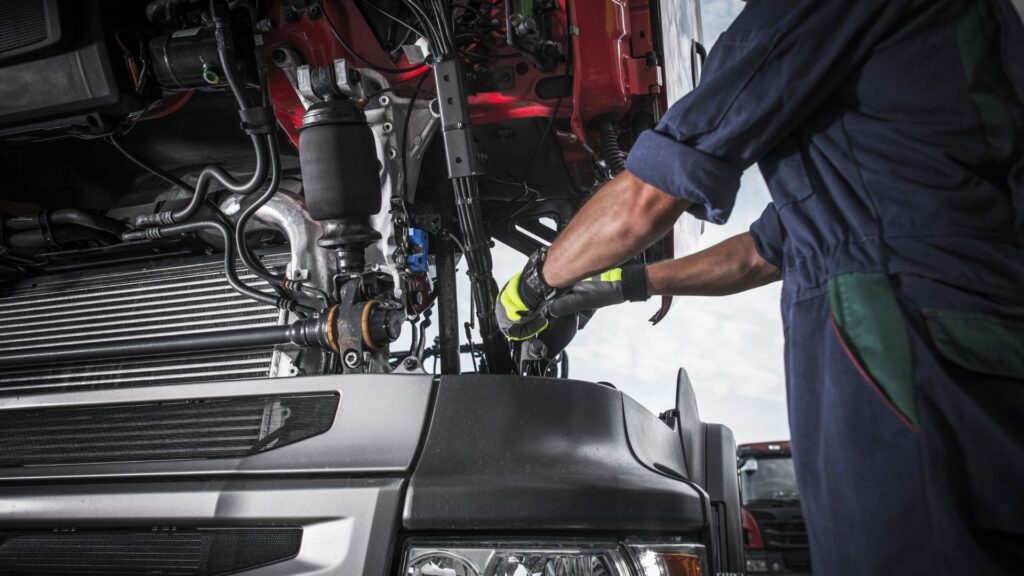Attention all truck drivers! Are you tired of costly breakdowns and unexpected repairs on the road? Look no further, because we have the ultimate guide for you. In this blog post, we will cover everything you need to know about semi repair essentials. From routine maintenance tips to emergency troubleshooting tricks, we’ve got you covered. So buckle up and get ready to hit the road with confidence!
Need a hand while on the road? We’re here to help you! Call us here.
Importance of Regular Maintenance for Trucks
One of the main reasons why regular maintenance is essential for trucks is to ensure their safe operation on the road. Trucks are heavy-duty vehicles that carry heavy loads over long distances, making them more susceptible to wear and tear. Without proper maintenance, critical components such as brakes, tires, and suspension can fail unexpectedly while driving, putting you and other drivers at risk.
Moreover, regular maintenance helps in detecting potential issues before they become major problems. By following a consistent schedule of inspections and tune-ups, mechanics can identify small issues like worn-out belts or leaks that may not be visible to the untrained eye. Addressing these problems early on can prevent them from turning into more significant and costlier repairs down the road.
Another reason why regular maintenance is vital for trucks is to improve fuel efficiency. A well-maintained truck will run more efficiently with better gas mileage than one that has been neglected. This means you’ll save money on fuel costs by ensuring your truck’s engine runs smoothly without any hindrances like low oil levels or dirty air filters.
We recommend you to see this article: Emergency Diesel Mechanic: A Tutorial for Swift On-the-Road Repairs
Common Semi Repairs and How to Identify Them
Rough roads, heavy loads, and long distances can all cause wear and tear on your tires, leading to uneven tread wear or even blowouts. It’s important to regularly check your tire pressure and look for any signs of damage such as bulges or cracks. Uneven tread wear can indicate a misaligned axle, which should be addressed immediately to prevent further damage.
Another frequent issue with semi trucks is brake problems. The brakes on a semi truck endure a lot of stress and need to be checked regularly for proper functioning. If you notice any grinding noises or feel vibrations when braking, it may be time for new brake pads or rotors. In addition, leaks in the brake lines should not be ignored as they can lead to complete brake failure.
Electrical system issues are also common in semis. With so many electronic components in modern trucks, there are many potential points of failure that could leave you stranded on the side of the road. Regularly checking your battery connections and ensuring they are free from corrosion can help prevent electrical problems. If you notice warning lights on your dashboard or experience starting issues with your truck, it may be time for a professional inspection.
No breakdown can keep us apart. We’ll be there with our emergency response team. Contact us here.
Essential Tools and Equipment Every Truck Driver Should Have
To make your job easier and safer, it is crucial to have the right tools and equipment at your disposal. In this section, we will outline some of the essential tools and equipment that every truck driver should have.
1. Tire Pressure Gauge: As a truck driver, you need to constantly monitor your tire pressure to ensure safe driving conditions. A tire pressure gauge allows you to quickly check the air pressure in each tire before hitting the road.
2. Spare Tires: Flat tires are a common occurrence for truck drivers, which is why having spare tires on board is crucial. Make sure they are properly inflated and in good condition before setting out on a journey.
3. Road Flares or Reflective Triangles: In case of an emergency or breakdown, it is essential to have road flares or reflective triangles to warn other motorists of your presence on the side of the road.
4. Basic Hand Tools: A set of basic hand tools such as screwdrivers, wrenches, pliers, and hammer can come in handy for minor repairs and adjustments while on the road.
5. Jumper Cables: Dead batteries can happen unexpectedly, especially during colder months when trucks are more susceptible to battery failure due to extreme weather conditions. Having jumper cables can save you from being stranded on the side of the road waiting for assistance.
We recommend you to see this article: On-the-Road Semi Repairs: Mastering Quick Fixes
Tips for DIY Semi Repairs on the Road
When you’re out on the road as a truck driver, unexpected breakdowns and repairs are an unfortunate reality. However, not all repairs require a trip to the mechanic – there are some DIY semi repair tips that every truck driver should know. Not only can these tips save you time and money, but they can also keep you safe on the road until you can reach a professional for further assistance.
1. Carry Essential Tools and Spare Parts: The first step in being prepared for any potential semi repairs is to pack essential tools and spare parts in your truck at all times. This may include items such as wrenches, screwdrivers, pliers, duct tape, fuses, spare belts and hoses, and other basic tools that can help with common issues like changing tires or replacing blown fuses.
2. Know How to Change Tires: Flat tires are one of the most common issues faced by truck drivers on the road. Knowing how to change a tire is crucial for any DIY semi repair. Make sure you have all the necessary equipment such as a jack, lug wrench, spare tire, and safety cones or warning triangles before attempting to change a tire.
3. Check Your Fluid Levels Regularly: Keeping an eye on your fluid levels is important for preventing major mechanical problems while driving. Make it a habit to check your oil, coolant, brake fluid, power steering fluid, and transmission fluid levels regularly during rest stops or fuel fill-ups.
4. Understand Basic Electrical Systems: Understanding basic electrical systems in your truck can be beneficial when facing issues like dead batteries or faulty alternators. Make sure you know where the battery terminals are located and carry jumper cables with you in case of emergencies.
5. Educate Yourself About Common Semi Repairs: Knowing about common semi repairs such as air brake system troubleshooting or replacing worn-out belts can save you from being stranded on the side of the road waiting for help. Take some time to educate yourself about the inner workings of your truck and how to troubleshoot common issues.
Your salvation on the road. Explore our fast 24/7 repair services here.
Importance of Knowing a Reliable Repair Shop
Time is money in the trucking industry, and every minute spent on the road counts towards meeting deadlines and generating income. A reliable repair shop will have skilled technicians who can diagnose and fix any issue with your semi-truck promptly. This minimizes downtime and ensures that you get back on the road as soon as possible.
In addition to saving time, having a dependable repair shop also helps save money in the long run. Often, when faced with an unexpected breakdown or mechanical issue, drivers may be tempted to seek out the cheapest option for repairs.
However, this could lead to subpar workmanship or low-quality parts being used, resulting in further breakdowns down the line. A reputable repair shop will use high-quality parts and provide top-notch services that ensure your semi-truck stays in good condition for longer periods.
In conclusion, knowing a reliable repair shop is crucial for truck drivers. It saves time, money, reduces stress levels, and can lead to discounts and special offers. It is essential to research and establish relationships with reputable repair shops to ensure smooth operations on the road.
For more tips and info, follow us on Facebook and Instagram. Call us for truck repair road service on: trucktrailerrepairservice.com

